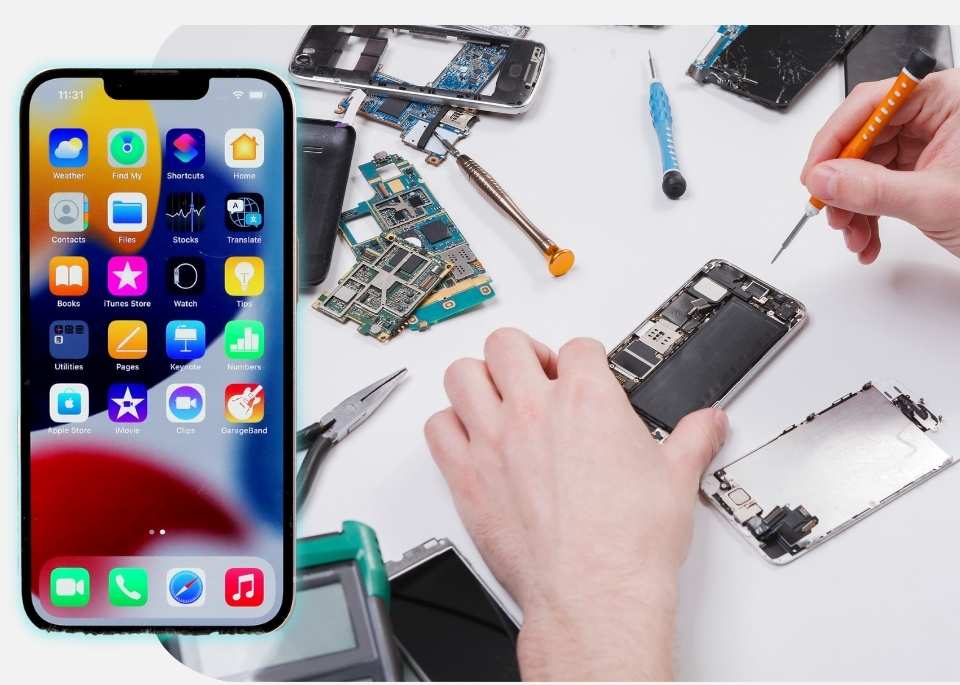Introduction:
In today’s digital age, our smartphones are more than just communication devices; they’re our lifelines, organizers, and entertainment hubs. However, accidents happen, and our beloved gadgets can end up in need of emergency repairs. To avoid the hassle and expense of sudden phone fixes, here are seven practical tips to keep your device in excellent condition.

Invest in a Sturdy Phone Case
- A Protective Shield: Choosing a durable phone case can significantly reduce the risk of damage from accidental drops or knocks.
- Look for Quality: Opt for cases made from shock-absorbent materials like TPU or polycarbonate, and ensure they offer proper coverage for all sides of your phone.
Apply a Screen Protector
- Shield Against Scratches: A good quality screen protector can safeguard your phone’s display from scratches, cracks, and other damage.
- Bubble-Free Application: Follow the manufacturer’s instructions carefully to apply the screen protector without any bubbles or imperfections, ensuring maximum protection.
Practice Safe Charging Habits
- Avoid Overcharging: Overcharging your phone can degrade the battery over time, leading to decreased performance and potential safety hazards.
- Unplug Overnight: Disconnect your phone from the charger once it reaches full battery to prevent unnecessary strain on the battery.
Keep Your Phone Dry
- Water Damage Prevention: Water is one of the leading causes of phone damage. Keep your device away from liquids, and invest in a waterproof case if you’re prone to accidents.
- Emergency Response: In case of accidental exposure to water, act quickly by powering off your phone, removing the battery (if possible), and drying it thoroughly with a soft cloth or silica gel packets.
Regular Software Updates
- Stay Up-to-Date: Regularly updating your phone’s operating system and apps not only ensures optimal performance but also patches security vulnerabilities that could compromise your device.
- Automatic Updates: Enable automatic updates on your phone to ensure you never miss important software patches or bug fixes.
Handle Your Phone with Care
- Gentle Treatment: Avoid subjecting your phone to unnecessary stress or pressure, such as sitting on it or placing heavy objects on top.
- Mindful Storage: Store your phone in a safe place away from extreme temperatures, humidity, or direct sunlight, which can damage its internal components.
Backup Your Data Regularly
- Data Security: In the event of a phone malfunction or irreparable damage, having a recent backup of your data ensures you won’t lose precious photos, contacts, or important documents.
- Cloud Storage Options: Take advantage of cloud storage services like Google Drive or iCloud to automatically back up your data, providing peace of mind in case of emergencies.
Sure, let’s expand on each of the tips with more detail and additional advice:
Opt for Quality Accessories
- Beyond just a sturdy phone case, consider investing in other quality accessories such as charging cables, power banks, and car mounts. Low-quality accessories can not only compromise the performance of your device but also pose safety risks such as overheating or short-circuiting.
- Research Before Purchase: Before buying any accessories, read reviews, and ensure they are compatible with your phone model to avoid compatibility issues or damage.
- Warranty and Return Policy: Opt for accessories that come with a warranty or a reliable return policy. This ensures that if the accessory fails to meet your expectations or damages your device, you have recourse for a replacement or refund.
Practice Battery Care
- Avoid Extreme Temperatures: High temperatures can accelerate battery degradation, while extreme cold can temporarily reduce battery life. Keep your phone away from direct sunlight, heat sources, or freezing temperatures.
- Optimize Battery Settings: Most smartphones offer battery-saving features that can extend battery life, such as low power mode or battery optimization settings. Utilize these features to maximize your phone’s battery lifespan.
- Regular Calibration: Occasionally allowing your phone’s battery to fully discharge and then fully recharge can help calibrate the battery, ensuring accurate battery level readings and prolonging its lifespan.
Be Mindful of External Factors
- Pet and Child Safety: If you have pets or small children around, be mindful of where you leave your phone. Curious pets or children may accidentally knock over or chew on your device, leading to unexpected damage.
- Environmental Hazards: Be cautious in environments with potential hazards such as sand, dust, or debris. These particles can infiltrate your phone’s ports, speakers, or buttons, causing functionality issues or damage over time.
Practice Secure Handling
- Avoid Pocket Overload: Carrying your phone in overcrowded pockets with keys, coins, or other sharp objects can lead to scratches or screen damage. Consider using a dedicated phone pocket or pouch to protect your device.
- Grip and Stability: When using your phone, ensure a secure grip to prevent accidental drops. Avoid holding your phone precariously over hard surfaces or while engaged in activities that require your full attention, such as walking or driving.
Stay Informed and Prepared
- Warranty Coverage: Familiarize yourself with your phone’s warranty coverage and any extended warranty options available. Understanding your warranty can save you money on repairs or replacements if your phone experiences issues covered under warranty.
- Emergency Repair Services: Research reputable repair shops or authorized service centers in your area ahead of time. Knowing where to go in case of an emergency can save you time and stress if your phone requires professional attention.
By incorporating these additional tips into your phone care routine, you’ll not only minimize the risk of emergency repairs but also ensure your device remains in optimal condition for longer, providing you with reliable performance and peace of mind.

Conclusion:
By following these seven essential tips, you can significantly reduce the risk of needing emergency phone repairs and prolong the lifespan of your device. Investing in quality accessories, practicing safe charging habits, and handling your phone with care are simple yet effective ways to keep it in top shape. Remember, prevention is always better than cure when it comes to preserving your smartphone investment.
Tech tantrums? We’ve got the fix! 🛠️ laptops 🖥️ to iPhones 📱, MacBooks 💻 to iPads, Your one-stop solution for all things digital. From laptops to smartphones, we mend them all! 💼 Visit digimob.com.au for swift and reliable repairs. 🚀
Frequently Asked Questions (FAQs)
How often should I replace my phone case and screen protector?
- It’s recommended to replace your phone case and screen protector whenever signs of wear and tear become noticeable. This could include cracks, scratches, or loose fitting. Generally, replacing them annually or whenever significant damage occurs can help ensure continued protection for your device.
Can I use any charger with my phone, or should I stick to the manufacturer’s charger?
- While many chargers may work with your phone, it’s safest to use the charger provided by the manufacturer or certified third-party chargers. Using incompatible or low-quality chargers can lead to overcharging, overheating, or damage to your phone’s battery and internal components.
How can I tell if my phone has water damage, and what should I do if it gets wet?
- Signs of water damage may include a malfunctioning screen, distorted audio, or visible moisture in the device’s ports. If your phone gets wet, immediately power it off, remove the battery (if possible), and dry it thoroughly with a soft cloth or silica gel packets. Avoid using heat sources like hair dryers, as they can cause further damage. If the damage is extensive, seek professional repair assistance.
What’s the best way to back up my phone data, and how often should I do it?
- The best way to back up your phone data is by utilizing cloud storage services such as Google Drive, iCloud, or Dropbox. These services offer automatic backups of your photos, videos, contacts, and documents, ensuring your data is securely stored off-device. It’s advisable to set up automatic backups and ensure they occur regularly, ideally daily or weekly, to minimize the risk of data loss.
Is it safe to leave my phone charging overnight, or should I unplug it once it’s fully charged?
- While modern smartphones are designed to prevent overcharging, it’s generally safer to unplug your phone once it reaches full charge to minimize stress on the battery. Over time, continuous charging can contribute to battery degradation. If you prefer to charge overnight, consider using a smart charger or charging hub with features like automatic shutoff to prevent overcharging.


